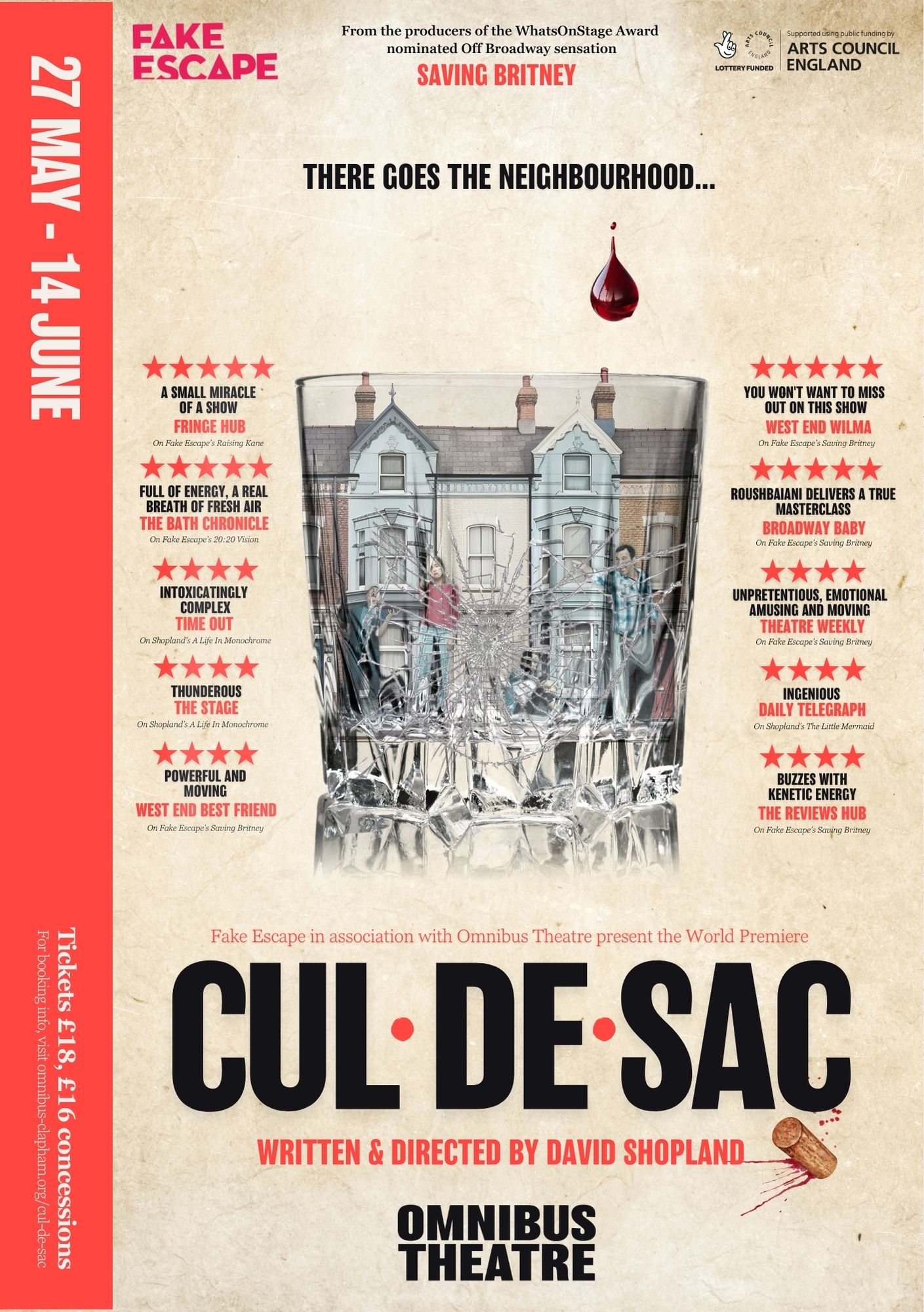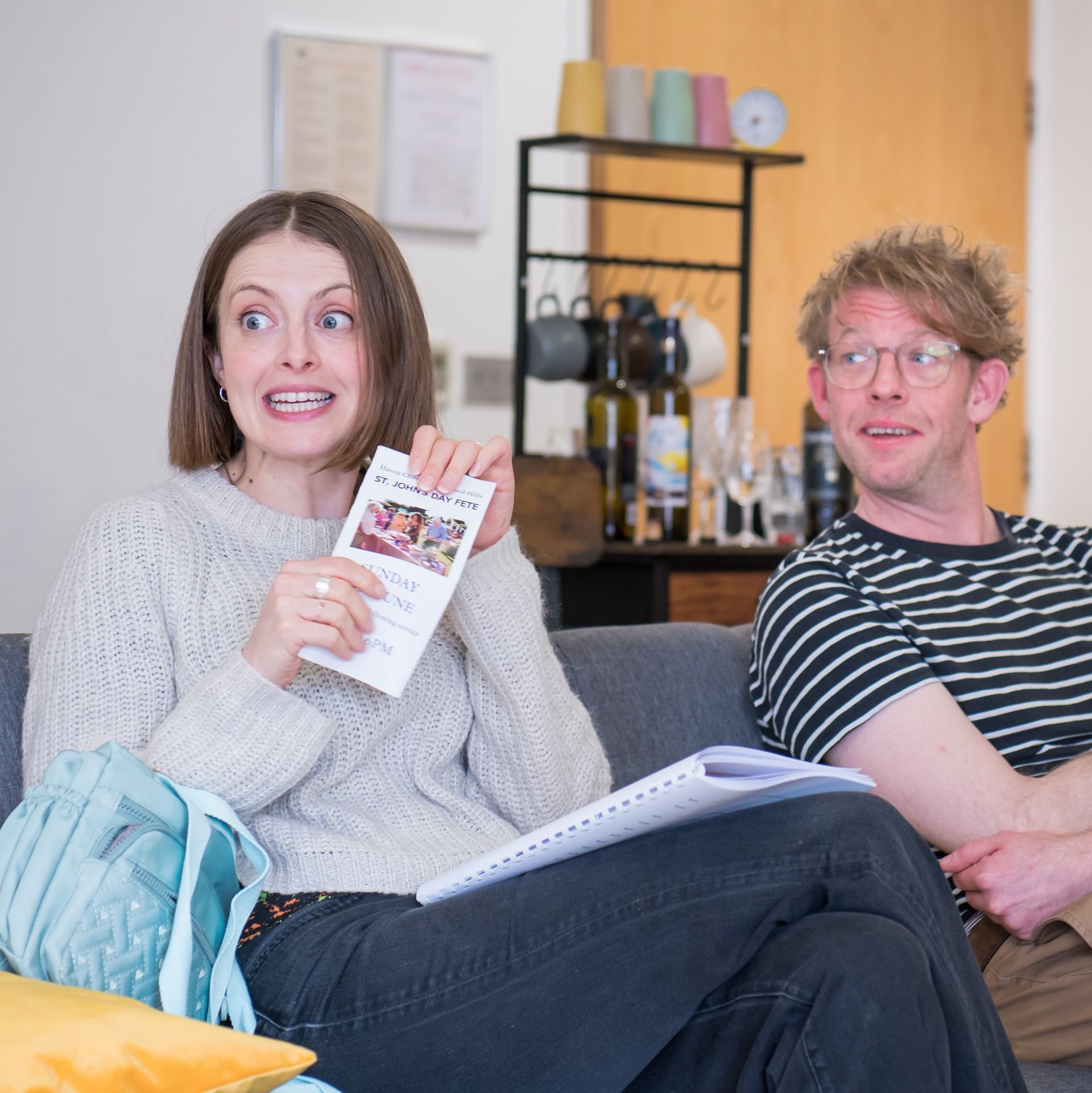INTERVIEW
Multi-award nominated playwright DAVID SHOPLAND chats about his new play CUL-DE-SAC premiering at Omnibus Theatre Clapham 27 May – 14 June 2025
From the company that brought us hit show SAVING BRITNEY (sold out performances, Uk tour) comes this premiere of CUL-DE-SAC written and directed by David Shopland.
After the success of your play SAVING BRITNEY, inspired by the #FreeBritney movement, did this spur you on to write further socially aware dramas?
I think I’ve always been drawn to interweaving cultural commentary with entertainment since I started writing nearly 2 decades ago. I was lucky to have a very socially conscious head of course at Drama School, Steven Dykes, who instilled in me the importance of not simply allowing an audience to sit back and relax, but to sit forward and engage. Cul-de-Sac is packed with humour, paying tribute to this country’s traditions of farce and sitcom, but it was important to me that beyond that, much like ‘Saving Britney’, it offered up difficult conversations and no easy answers.
We love the opening line for the synopsis of your new play, ‘a wine-stained comedy-drama about the chaos behind closed doors’. Why ‘wine-stained’?
Although only really directly referenced in the play a small handful of times, alcohol is a silent character throughout, Banquo’s Ghost at the feast. One of the common catalysts for those developing alcohol addiction problems, especially more affluent, older people, is often to self-medicate for depression, boredom, sadness et al. The characters are trapped in many ways in lives they don’t feel fit them quite right – and so they drink to take the edge off.
We also relate to the lines about culture and society spinning faster and faster like a roundabout. ‘And if we miss the landing, that’s it. It’s over.’ There is clearly an important point to be made, what are the major themes?
As I myself approach 40 in the next couple of years, and Generation Z make way for Generation Alpha, there is a feeling that the Millennial generation are falling between the cracks of the old world and the new, especially with technology. We didn’t grow up with social media, and yet we are expected to keep up with the ever-accelerating speed of innovation as if we have never known any different. The promises of New Labour never came true and the lives many of my generation thought they were going to have, even believed they deserved to have, haven’t happened. This is a play that explores those frustrations, and the lack of clarity as to where people in their late 30s – early 40s fit in society anymore.
Billed as a comedy drama, what are your favourite moments in the play?
As I mentioned before, as well as exploring some difficult topics, the play is rife with humour. There are some lovely moments where bellyaching humour is immediately undercut with sorrow or anger, and vice versa. Without giving too much away, there is a particular moment that I am slowly falling in love with, where our use of a My Fair Lady number totally inverts its meaning and creates an atmosphere within a scene almost antithetical to the song’s original intended impact.
We’re also interested to have your writing tips for comedy; some people have a gift for it and other learn the craft. Where does it stem from?
One of my favourite parts of rehearsals is dissecting the science of comedy and trying to pinpoint the reason why something is funny. Recently during rehearsals, we were stuck on a piece of blocking that wasn’t landing and all of a sudden one of the actors simply moved about a foot further stage left, and we were all in fits of laughter. As the old adage goes, ‘humour is a serious business’, but I think that’s the trick. You must approach the crafting of a joke or a comedic set-piece with the same care, attention to detail and seriousness as you would high drama. For me, I think one of the most important things to remember is that most comedy is context-specific. We all know people in our lives who are naturally funny or get into humourous situations, but 9 times out of 10 that person or those stories would never translate to stage or screen because audiences don’t know the context. Most things that you find funny in real life end up being ‘You Had To Be There’ moments, so it’s really important to be self critical and collaborative to ensure that what you craft is objectively funny, as opposed to amusing to you because of a set of very personal, individual circumstances.
We also note that your company Fake Escape which you founded in 2013 has produced work staged all over the world. How are you expecting audiences to respond to Cul-De-Sac given the multi-culturalism of London.
I wrote this play specifically with London audiences in mind. In fact, if anything I wonder more how audiences outside of the capital would resonate with the production, with a UK Tour very much the desired next step after this run. Cul-de-Sac is set in Zone 6 North West London, and it is a play that revolves around what living on the fringes of our capital means; again, coming back to the idea of falling between the cracks. As someone who grew up in South West England but has lived in various outer Zones of London for 17 years, I know that this is something really only people living in London understand. In terms of the multiculturalism of London, this is reflected in the play and the very core of many of the difficult topics that are touched upon, including islamophobia and inherited trauma.
As director of the show, do you have an overall vision, or is this something that emerges as rehearsals progress?
I think it’s a mixture. Having written the play 7 years ago, I have had a lot of time to visualise the play in action and there are definitely many moments that have solidified in my head; especially given that 3 of the 5 cast are the actors I originally wrote the parts for. Having said that, more than anything else in my work, I love collaboration. From the beginning of rehearsals I have been clear that I wanted the creative process to be very ensemble-led, and many of my favourite parts of the play (including the afore-mentioned My Fair Lady sequence) have been suggestions from the cast. We are very lucky to boast an unbelievably talented cast, and the way they have breathed life into the play extends far beyond anything I was capable of visualising before.
Images: Rehearsals of Cul-de-Sac (photographer Kat Forsyth)
We’d would be very interested to know more about your rehearsal process and who you’re working with on the show.
We have an incredibly talented team making Cul-de-Sac happen. Shereen Roushbaiani and Ellis J. Wells lead the cast as Ruth and Frank Townsend respectively. Shereen, I worked with on Saving Britney, and her natural vulnerability, stillness and detailed characterisation was perfect for Ruth. Ellis, I have worked with several times over the years through the 20:20 Vision New Writing Festival I run as part of Bath Fringe, and his endlessly interesting character choices, use of pace and overall presence have always been in my mind for Frank. The 3rd performer for whom a part was actually written is Callum Patrick Hughes, playing the naive and loveable Simon Waller. Callum and I have been collaborators for over a decade and a half, and his keen understanding of comedy, especially the traditions of farce and slapstick, are used to great effect in this production. The characters of Marie Gilchrist and Hamza Al-Haytham I wrote without any particular actors in mind, so the audition process for these two parts was intense but thoroughly enjoyable. Lucy Farrett and Behkam Salehani both exceeded my expectations in terms of being able to find the ‘perfect’ actors for those roles. Lucy’s timing and unique ability to play both humour and pathos on the flip of a coin and Behkam’s beautifully understated naturalism make it hard for me to believe I DIDN’T write the parts for them, as they both those roles like a glove. Behind the scenes I have the excellent Ellie Holloway as my Stage Manager, also known as my ‘Second Brain’! She is the anchor of the rehearsal room and keeps us on track and sailing smoothly. I’m assisted in directing by Lexie Woodroof, who is joining us on a placement from University of East London. Having another outside eye in the room, especially being the writer as well as the director, has been essential, and Lexie’s keen eye for detail and nuance has been invaluable thus far. Creatively, our Movement Director Jahraine James has added a polish and a beating heart to the bookends of each act that tie the whole production together beautifully, and my dramaturg Roann Hassani McCloskey had kept me accountable and honest with their provocations and suggestions. Frankly there is a much weaker version of Cul-de-Sac that exists in a world where Roann isn’t dramaturg.
You’re bringing the show to Omnibus Theatre in Clapham, why this area in particular?
I have wanted to work in collaboration with The Omnibus and their fearless AD Marie McCarthy for many years, but we could never find the right project, until Cul-de-Sac. Marie and The Omnibus have been major champions of the play for nearly 2 years, and have been incredibly accommodating in their partnership. Not only is the venue itself perfect, but Clapham – and in particular Clapham Old Town – is the exact kind of location where the characters of the play would find themselves. Clapham Old Town is one of those London enclaves that exists within easy and quick commute of the centre whilst also having very much its own local identity; again, creating an environment where the thousands of Millennials who live in that area continually feel trapped between two worlds... just like the play.
Although the show is about millennials, are there aspect of it that you think everyone will recognise in themselves?
Absolutely. In fact, not all of the characters themselves fit neatly within that generational bracket, but even the ones that are all exhibit traits of the human condition that exist in all of us. If you’re someone who has experienced loss or tragedy, if you’ve had difficulty dealing with grief, if you’ve found yourself trapped in an existence that felt wrong – you will see parts of yourself in this production, without a doubt.
Finally, what are you most looking forward to sharing with audiences?
As a writer, I always try really hard not to TELL an audience anything. As those who saw Saving Britney will know, I like to relatively ambiguously present various different viewpoints and ultimately leave the audience to argue and debate after the show. I feel like I’ve done my job well if an audience leave one of my plays not only unable to pinpoint my own personal beliefs and opinions, but leave discussing the play at all. I suppose then, to answer, I am most looking forward to sharing questions.
CUL-DE-SAC by David Shopland
Presented by Fake Escape
At Omnibus Theatre, Clapham
27 May – 14 June 2025
Suburban life, unfiltered: David Shopland’s new play is a wine-stained comedy-drama about the chaos behind closed doors.
“It feels like things are getting faster, faster. Like culture, society, whatever is this roundabout in the middle of a park, and it’s spinning faster and faster and we’re all just trying to jump on at the right time. And if we miss the landing, that’s it. It’s over.”
Northwood Hills. Zone 6 London. The Middle of Nowhere.
Ruth is questioning every decision she’s ever made. Simon is grappling with a personality he can’t quite define. Marie is keeping a secret that could shatter everything. And Frank? Frank just wants his driveway back.
What starts as a quiet evening rapidly unravels, as polite smiles give way to sharp words, truths spill as freely as the booze, and when an unexpected guest arrives, the night explodes into chaos. It’s suburbia like you’ve never seen it before.
WhatsOnStage and multi OffWestEnd Award nominated playwright David Shopland dissects contemporary Britain with the precision of a scalpel and the unpredictability of a slammed door, peeling back the layers of Millennial civility with unflinching honesty. Tackling everything from cultural identity to the ever-increasing price of a London pint, Cul-de-Sac is a witty wine-soaked post-mortem on the quiet desperation simmering behind net curtains.











